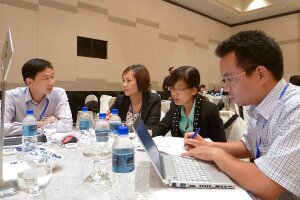 Within the past decade demand for freight and logistic services around Asia has been on a continuous rise. Driven by increasing economic growth and Asia’s ever rising importance as global production hub, this trend does not seem to slow down. This development positively contributes to local and regional economies as well as helps to alleviate poverty in the region. However, this trend also implicates negative side effects. Within the transport sector, freight and logistic services in many Asian countries account for up to 40% of total energy use and contribute equally to local air pollution and greenhouse gas (GHG) emissions. Therefore, a call for greener freight and logistic services in Asia was made and the industry is noticing a rising interest in environmentally sustainable operations.
Within the past decade demand for freight and logistic services around Asia has been on a continuous rise. Driven by increasing economic growth and Asia’s ever rising importance as global production hub, this trend does not seem to slow down. This development positively contributes to local and regional economies as well as helps to alleviate poverty in the region. However, this trend also implicates negative side effects. Within the transport sector, freight and logistic services in many Asian countries account for up to 40% of total energy use and contribute equally to local air pollution and greenhouse gas (GHG) emissions. Therefore, a call for greener freight and logistic services in Asia was made and the industry is noticing a rising interest in environmentally sustainable operations.
Within this context, the GIZ “Energy Efficiency and Climate Change Mitigation in the Land Transport Sector in the ASEAN Region” project and the Asian Development Bank (ADB) organised a regional workshop on best practices and systematic approaches towards efficient logistics and green freight in Singapore last week. The 3-day workshop targeted government representatives from all over Asia, international organisations and financiers, the private sector, and academia. The overall aim was to promote peer learning and exchange among key stakeholders from the freight and logistics industry as well as to enable networking and partnership opportunities. The workshop was organised as a mix of presentations, panel sessions, breakout sessions, and study visits to freight service providers and facilities in Singapore.
The workshop was inaugurated by Bambang Susantono, Vice Minister of the Ministry of Transportation of the Republic of Indonesia, who highlighted trends in freight traffic and the demand for greener logistic services in Indonesia. This was followed by a discussion panel with experts from the USA and Europe who gave insights into green freight and logistics developments as well as lessons learned from their respective country. Another highlight of the day was a panel session with experts from different Asian countries who presented national current trends and future pathways for green freight and logistics. The second day of the workshop was started with two presentations focusing on approaches towards more sustainable freight services and was then followed by breakout sessions. In small groups, participants discussed options for “green freight action plans”, potential barriers and possible solutions. The last workshop day was reserved for government representatives to work together and develop concrete project ideas based on lessons learned from the previous two days.
The workshop agenda and presentations can be downloaded here.
Representative of the GIZ China “Green Logistics in China Project” were also attending the workshop in Singapore to engage with relevant stakeholders and learn about the experiences made in other Asian countries. The workshop in Singapore was also a good preparation for the upcoming “China Green Freight Initiative International Seminar” organised by the China Road Transport Association (CRTA) and held in Beijing this week. The Seminar focuses on bringing the China Green Freight Initiative (CGFI) – a national programme on to improve fuel efficiency and reduce CO2 and air pollutant emissions from the road freight sector in China – forward by discussing policies and practices to enhance the green freight sector. The Green Logistics in China Project will contribute to this expert session with two presentations on low resistance tires and carbon foot printing in the freight industry.


